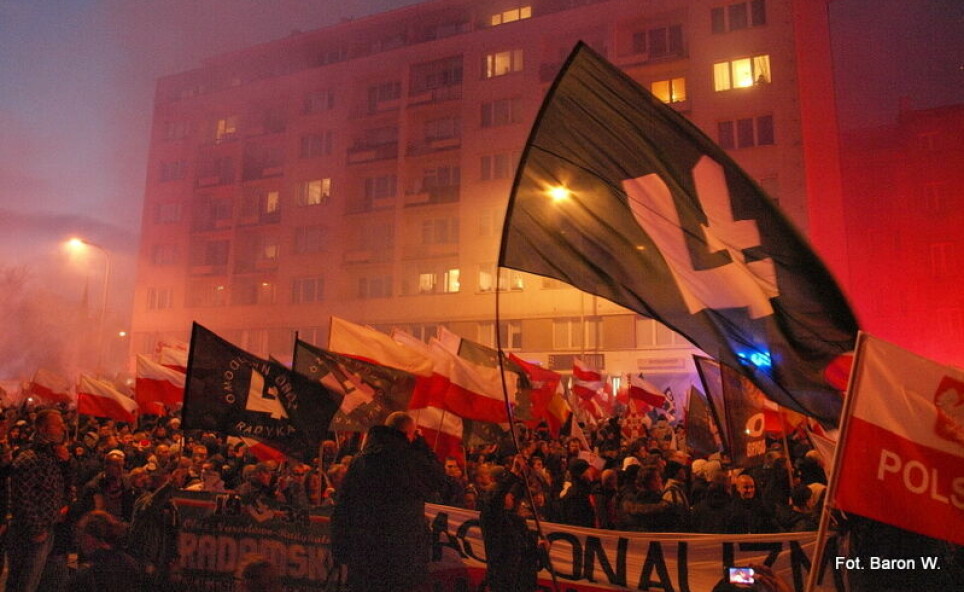
Right Now!

The Polish Independence March 2021 – nationalized nationalism
The Independence March passed through Warsaw once again. This time, no flat was burnt, no shops were vandalized, no squat or embassy attacked, and no freshly planted trees were torn out. According to Przemyslaw Witkowski, this is a worrying development, as it signals that nationalists are gaining political power in Poland and beyond.
As was the case in previous years, the Polish Independence March on 11 November attracted far-right actors from Poland and beyond. Polish nationalist neo-paganists from Niklot, fascists from the Italian Forza Nuova, radical nationalists from the National-Radical Camp (ONR), and Hungarian revisionists from the Sixty-Four Counties Youth Movement (HIMV) had their own block. The leader of Hungarian far-right party Mi Hazánk Mozgalom, László Toroczkai also appeared in the Polish Parliament. The march was led by a nationalist, former ONR leader, and president of the March of Independence Association (SMN), Robert Bąkiewicz. However, the 2021 Independence March differs from previous years in some respects. Whereas neo-fascist stormtroopers and autonomous nationalists previously formed a 'black block', they have now disappeared into the crowd. A year ago, a large part of their banners were removed by the SMN. This applied to openly racist, neo-Nazi and most neo-fascist banners. As a result, today it is difficult to find someone more hated among Polish neo-fascists than the march organizer Bąkiewicz, accused by them of treason, being an agent of counterintelligence and the police, and selling the march to the ruling party Law and Justice (PiS).
The funding of religious nationalism
The smooth progress of the march should not be surprising. The research of Dr. Daniel Płatek clearly shows that the closer Polish nationalists are to power in Poland, the more peacefully the March of Independence runs. They have never been this close. The ruling right-wing populist Law and Justice party (PiS) has been investing money in Bąkiewicz for a long time in order to be able to benefit from the event he manages. Another institution led by Bąkiewicz, Centrum Niepodległości, is waiting for the unblocking of grants amounting to €1.25 million from government funds. The money is to go to the Independence March, the Independence March Association (SMN), and the Youtube Channel “National Media”, which is owned by SMN and popular in nationalist circles, in order to purchase sound equipment, cars, and real estate.
This is somewhat reminiscent of the situation on the Polish political scene in the mid-1930s, when the ruling military junta (National Unification Camp) was looking for people who would build support for them using fascist sentiments after the death of the dictator Józef Piłsudski. Today, the PiS is also increasingly 'borrowing' support from the extreme right. Former members of the nationalist organizations of the League of Polish Families, All-Polish Youth, the National Movement, ultra-religious integralists and radical nationalists cling to PiS. They are united by religious fanaticism and firmly rooted in the vicinity of the Catholic Church. With PiS, they count on support to stop the processes of secularization and Europeanization of Poles. Public funds flow to this array of different far right and religious movements, so that successive MPs and PiS ministers (Adam Andruszkiewicz, Tomasz Rzymkowski, Przemysław Czarnek or Anna Siarkowska) may prove their nationalist ideological 'origin', and public institutions such as the Institute of National Remembrance (IPN) are full of nationalists who can at this point, consider this stage of his 'march through the institutions' as a success. Bąkiewicz, the organizer of the Independence March, is also supposed to be such a figure.
‘Independence is not for sale’
The connection between the Polish far right and PiS is shown in different ways, during the march. For example, by the posters of the Independence March, like the one modeled on Nazi announcements with the name of the President of Warsaw Rafał Trzaskowski, who wanted to ban the Independence March, as a 'German' collaborator. The ritual burning of the portrait of the opposition leader Donald Tusk or the German flag is also a typical entertainment for PiS. Even the March slogan 'Independence is not for sale' can already be considered part of the PiS’ strategy of presenting Poland as a besieged fortress, threatened by encroachment of the European Union and globalization more generally. On the eve of Independence Day, PiS leader Jarosław Kaczyński spoke in a very similar tone as the nationalists on the march: 'Today, only three years later, we are facing enormous challenges. And with those that can be watched every day, parts of our eastern border and those that come to us from the West (...) Many on both sides of Europe do not want to accept our subjectivity, the perspective of our development, the growth of our strength, determination, determination to be an independent, free, but also strong nation'. A day later, Bąkiewicz announced in the same tone on the march that the attack originates 'not only from the East, the attack also continues from the West'. According to him, 'we are also attacked by Germany, which uses EU institutions to take away our sovereignty,' and 'they want to take away our national, cultural and even gender identity'.
Nationalist competition: PiS and the Confederation
One more reason for PiS' overgrowth of nationalist ideology is competition with another far-right party, the Confederation, which currently polls at 7 to 10 percent at the national level. Supporters of the Confederation are right-wing and far-right voters, which is why PiS is losing votes to this party. It is the reason why PiS is looking for prominent individuals capable of attracting nationalist voters to their party, for example by collaborating with actors such as Bąkiewicz. The Confederation, founded by nationalists, monarchists, religious integralists and ultraconservatives, co-opts successive groups of rebellious rightists. For example, it is closely related to the anti-vaccination movement, sealed in two elections by granting seats on the Confederation's election lists to the people of the leader of the anti-vaccine movement in Poland Justyna Socha, and to her position as the assistant of the Confederation MP Grzegorz Braun. The Confederation also provided strong support to anti-Semites during protests against the so-called Act 447 (the US Senate's resolution on America's support for heirless recovery of post-Jewish property in Poland).
The Confederation aims to represent, above all, frustrated members of the petty bourgeoisie, dissatisfied with a weak and corrupt state, so much so that they are ready to embrace the ideology of a complete breakdown of its structures in the name of privatizing responsibility for health care or education. In their narrative, PiS is a 'left-wing', 'socialist' party that raises the minimum wage, lowers the retirement age or gives social security. As a result of this perception, PiS remains the party of first choice for many low-income voters.
Eurosceptic and xenophobic
In matters of international politics, PiS struggles between remaining on the edge of the mainstream right and increasingly flirting with the far right. PiS largely continues the policy of the Civic Platform (the conservative-liberal party ruling before PiS), focusing on cheap labor as the basis of the Polish economy. The difference, however, lies in nationality. Whereas the lowest-paid jobs were formerly occupied by Poles, Polish workers have now been replaced by Ukrainians. This, in turn, gives the Confederation a basis for describing PiS as the supporters of uncontrolled migration. Hence, most likely, the harsh actions of the PiS government on the Polish-Belarusian border are aimed at showing right-wing voters that the accusations of the Confederates are baseless. After the increase in the number of migrants trying to cross the Belarusian-Polish border without appropriate documents, the PiS government has introduced a state of emergency in the border zone, has blocked journalists and non-governmental organizations' access to it under penalty of imprisonment and brutally pushes migrants back to the Belarusian side, without applying the procedure intended for asylum seekers. The governmental actions were accompanied with the slogan 'Defend Europe', popular among the extreme right. Once more, PiS is trying to outbid the Confederation.
While the Confederation officially aims to become the Polish version of the 'radical petty bourgeoisie' (in the spirit of the AfD or UKIP), PiS is step by step coming closing to the second family of the European far right - right-wing populists in the spirit of Salivini and Le Pen. At the beginning conservative and barely Eurosceptic, with the passage of time PiS has moved more and more to the right, becoming anti-EU and xenophobic. Officially, PiS still belongs to the European Conservatives and Reformists (ECR) group in the European Parliament, but its key members – Fratelli d'Italia and the Spanish Vox – have also shifted from the conservative right to becoming nationalist parties.
Far right unity in the European Parliament
The climate in Europe seems to be favorable for the ECR, and further growth is possible. Already in May 2021, the leader of the Italian Lega, Mateo Salvini, proposed the merger of the two European far-right factions Identity and Democracy (ID) and the ECR, into one supergroup. Two years earlier, Salvini had already tried to unite Lega, the French Rassemblement National, the Spanish Vox, Hungarian Fidesz and PiS under one banner. Recently, it seems that such a union is once more actively discussed between key far-right leaders across Europe.
Such a faction, if it was formed, could have up to 130 members in the European Parliament and would jump to third place in terms of size after the Christian Democrats and Social Democrats. Potential allies are divided by many issues, for example, the official course towards the US or the Kremlin, but PiS leader Kaczyński has made political turns on such issues before. Regardless of PiS’ anti-EU stance, it continues to be a part in its political structure, officially not proclaiming the idea of 'Polexit', and trying to show itself rather as a proponent of integration from the pre-EU European Communities period, while mobilizing voters at home with nationalism, xenophobia, homophobia and clericalism. Concretely, PiS advocates for economic integration, but not social or political integration, and is strongly against any form of cultural integration.
In domestic politics, PiS emphasizes nationalism more and more, and in international politics, it begins to form alliances with far-right parties. Taking the Independence March under public patronage, making large financial transfers to nationalists, and taking over some of their demands as part of the competition with the far-right Confederation are clear symbols of this change of position. Looking at this evolution, it is difficult to expect a softening of the political course, the more so as an increasing number of nationalists are joining the government, the ruling party, or starting to work in public institutions. Unless the government collapses under the weight of inflation, pandemic, and corruption scandals, we may expect a clearer course to the right.







